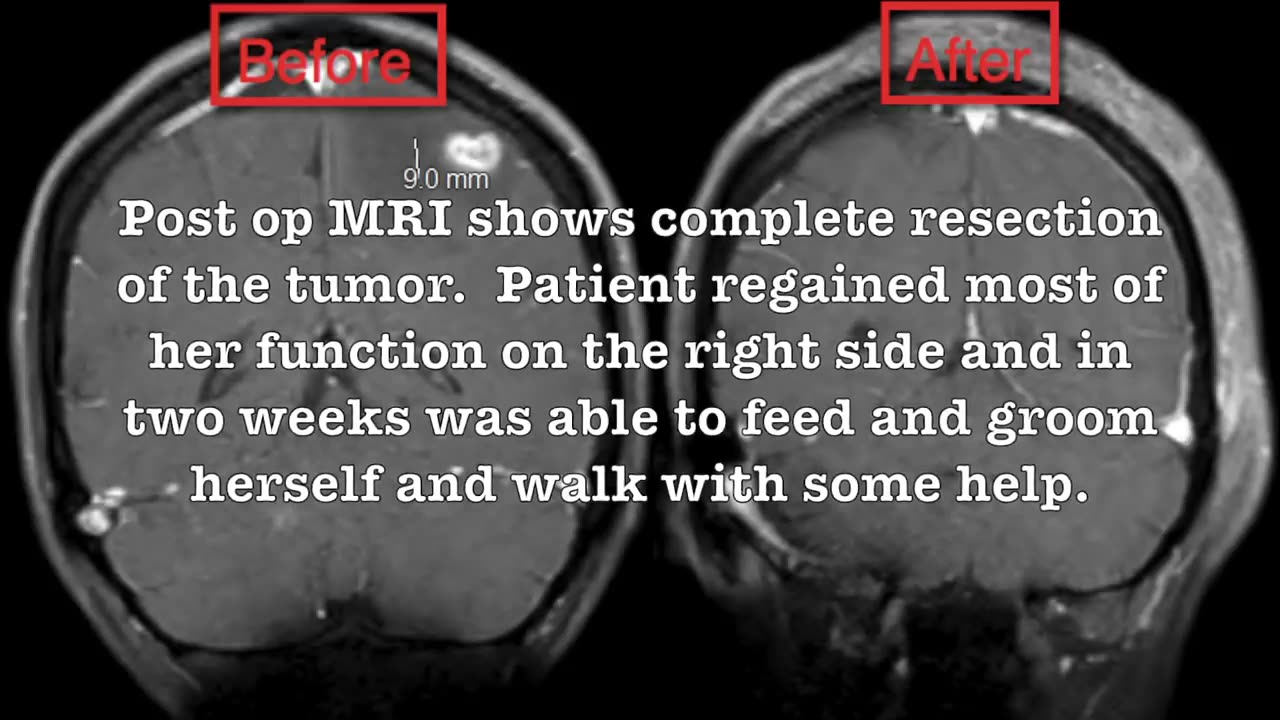Premium Only Content

Brain_tumor_surgery_in_a_lady_who_was_paralyzed_because_of_t
By Ana Sandoiu on May 14, 2018 — Fact checked by Tim Newman
Glioblastoma, one of the deadliest forms of brain cancer, may have found its nemesis. New research shows that the tumor, which is notoriously difficult to treat, can be halted by an experimental compound.
New research shows that an experimental compound can stop aggressive brain tumors from growing.
Glioblastoma is a particularly aggressive form of brain tumor, with a median survival rate of 10–12Trusted Source months.
Part of the reason why glioblastomas are so deadly is that they arise from a type of brain cell called astrocytes.
These cells are shaped like a star, so when the tumors form they develop tentacles, which makes them difficult to remove surgically.
Additionally, the tumors advance rapidly. This is because astrocytes provide support to neurons and control the amount of blood that reaches them; so, when tumors form, they have access to a large number of blood vessels, helping cancerous cells to grow and spread very quickly.
Another reason that glioblastomas are so difficult to treat is their high rate of recurrence. This is partly due to a subpopulation of cells contained in the tumor called glioma stem cells (GSC) — a type of self-regenerating cancer stem cell that controls the growth of tumors.
Subhas Mukherjee, Ph.D., a research assistant professor of pathology at the Northwestern University Feinberg School of Medicine in Chicago, IL, and his colleagues have been studying the behavior of these cells for a few years.
Building on this previous research, Mukherjee and team have now found that these cells contain high levels of an enzyme called CDK5.
Blocking this enzyme, the researchers show in their new study, stops glioblastomas from growing and inhibits the self-regenerating capabilities of GSCs.
The findings were publishedTrusted Source in the journal Cell Reports.
CDK5 inhibitor stops tumor growth
Previous research using a Drosophila fly model of brain tumors conducted by Mukherjee and team revealed that silencing the gene that encodes CDK5 decreased tumor size and the number of GSCs.
Further genetic screening in humans with glioblastoma revealed that these people also had high levels of the CDK5 enzyme.
Mukherjee further details the research process, saying, “We started running tests in our lab and found CDK5 promotes a high level of stem-ness in cells, so they proliferate and grow more.”
“We isolated the cells that were most stem-like, and found that they have a high level of CDK5 compared to ones that are less stem-like.”
Next, the researchers applied a CDK5 inhibitor to human glioblastoma cells. This stopped the tumors from growing and caused GSCs to lose some of their stem-ness, making it harder for them to regenerate.
The researchers also tested the efficacy of this enzyme-blocker on the three main subtypes of glioblastoma: the neural, classic, and mesenchymal subtypes.
Of these, the latter subtype was shown to have lower levels of CDK5, so in the future, this new approach may not benefit patients with mesenchymal glioblastoma as significantly.
New compound may halt tumor recurrence
Mukherjee comments on how his and his team’s findings may change therapeutic practices for the treatment of glioblastoma:
“The mortality rate for glioblastoma has only moderately changed in last 30 years,” he says. “The current drug, temozolomide, is somewhat effective when the tumor recurs — and one of the major problems with glioblastomas is they tend to come back.”
But, using the CDK5 inhibitor in combination with this chemotherapy drug might hinder tumor growth and stop them from returning.
“The idea is to kill the remnants and glioma stem cells after chemotherapy,” Mukherjee says. “Those are the cells that persist and cause recurrence.”
The CDK5 inhibitor — called CP681301 — can cross the blood-brain barrier, he explains, and the results of this study suggest that the compound is ideal for creating new drugs.
Mukherjee is already working on designing such a drug and is hopeful that the process will be quite speedy. “We will hopefully generate some models and start testing within a few months,” says the researcher.
GeneticsBiology / BiochemistryCancer / OncologyNeurology / Neuroscience
Share this article
RELATED COVERAGE
What causes a lump under the chin?
Medically reviewed by Christina Chun, MPH
A lump under the chin may be hard or soft, and tender or painless. This is not always a cause for concern. Learn about causes and when to see a doctor.
READ MORE
What causes lumps behind the ear?
Medically reviewed by Alana Biggers, M.D., MPH
Lumps behind the ear might be bumps in the skin, such as those caused by acne or cysts. Lumps can also indicate mastoiditis or enlarged lymph nodes…
READ MORE
Types, symptoms, and treatment of a brain tumor
Medically reviewed by Seunggu Han, MD
A brain tumor is a growth that develops in the brain or spinal cord. They may be malignant, developing aggressively, or benign. Symptoms include…
READ MORE
What to know about optic nerve glioma
Optic nerve gliomas are a type of benign tumor that develop in the glial cells of the optic nerve. Learn more here.
READ MORE
What side effects can radiation therapy on the brain cause?
Medically reviewed by Seunggu Han, MD
Radiation for brain cancer can cause a variety of side effects. Some are mild and short term. Others are more severe and may last for longer.
READ MORE
Get our newsletter
Keep up with the ever-changing world of medical science with new and emerging developments in health.
Enter your email
Your privacy is important to us
About Us
Contact Us
Terms of Use
Privacy Policy
Privacy Settings
Advertising Policy
Health Topics
Health Hubs
Medical Affairs
Content Integrity
Newsletters
© 2023 Healthline Media UK Ltd, Brighton, UK. All rights reserved. MNT is the registered trade mark of Healthline Media. Any medical information published on this website is not intended as a substitute for informed medical advice and you should not take any action before consulting with a healthcare professional. See additional information.
AboutCareersAdvertise with us
OUR BRANDS
Healthline
Medical News Today
Greatist
Psych Central
Bezzy
-
 2:59:21
2:59:21
TimcastIRL
3 hours agoTrump Calls Epstein Case A HOAX By Democrats, GOP Votes TO BLOCK Release | Timcast IRL
172K120 -
 10:17
10:17
Dr Disrespect
11 hours agoIt's Time To Get Serious
2.67K7 -
 LIVE
LIVE
SpartakusLIVE
5 hours agoDuos w/ Sophie || Charity stream tomorrow!
322 watching -
 58:43
58:43
Sarah Westall
3 hours agoBecause Voluntary Extermination is a Thing: Israel-Gaza w/ Award Winning Journalist James Robins
13.5K7 -
 LIVE
LIVE
BubbaSZN
5 hours ago🔴 LIVE - TRYING TO NOT BUST A$$ THIS TIME (THPS3+4)
50 watching -
 LIVE
LIVE
sophiesnazz
8 hours ago $0.91 earnedGENUINE BELTERS IN ERE l LIVE WITH @SpartakusLIVE!socials
100 watching -
 1:15:18
1:15:18
Glenn Greenwald
6 hours agoTrump Promises More Weapons for Ukraine; Trump Again Accuses Dems of Fabricating Epstein Files | SYSTEM UPDATE #487
107K69 -
 LIVE
LIVE
This is the Ray Gaming
1 hour agoTuesday Night is FOR THE BOYS | Rumble Premium Creator
97 watching -
 LIVE
LIVE
RaikenNight
2 hours agoDon't know what to play so I am doing a hangout stream
30 watching -
 2:14:46
2:14:46
RiftTV
6 hours agoTrump TRIPLES Down on Epstein COVER-UP.. MAGA Base ERUPTS | The Rift | Sarah Stock & Anna Perez
50.1K13